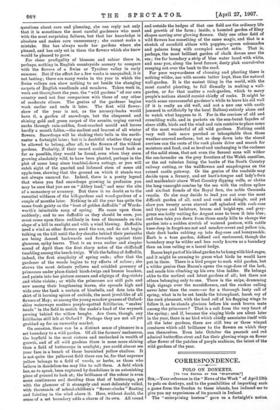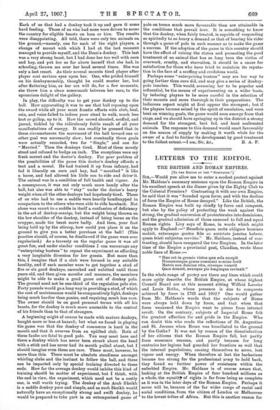CORRESPONDENCE.
POLO ON DONKEYS.
[TO TIEN EDITOR ON TUN "SPNOTATOR:3
Sts,—Your reference in the " News of the Week " of April 13th to polo on donkeys, and to the possibilities of importing such a game from the Soudan to these islands, has induced me to give you my experiences of its pursuit in Ireland.
The "enterprising hostess" gave us a fortnight's notice.
Each of us that bad a donkey took it up and gave it some hard feeding. Those of us who had none were driven to scour the country for eligible beasts on loan or Lire. The results were disappointing. All told, there were only ten animals on the ground,—namely, one for each of the eight players, a
• change of mount with which I had at the last moment managed to provide myself, and the Dean's donkey. This last was a very strong beast, but I had done her too well with corn and hay, and put her so far above herself that she had, in schooling, thrown me over her bead several times. She was only a last resort. As their several mounts tired player after player cast envious eyes upon her. One, who prided himself on his donkeymanship, thought he could master her, but .after flattering him, as her sex will do, for a few moments, she threw him a clean somersault between her ears, to the uproarious delight of the gallery.
In play, the •difficulty was to get your donkey up to the ball. How aggravating it was to see that ball reposing upon the sward while all your most frantic efforts with club, heel, -rein, and voice failed to induce your steed to walk, Much less trot or gallop, up to it. How the crowd shouted, scoffed, and jeered, tickled by the ridiculously futile result of all your manifestations of energy. It can readily be guessed that in these circumstances the movement of the ball toward one or other goal was necessarily slow; but eventually three goals were actually recorded, two for "Single," and one for " Married." Then the donkeys tired. Most of them merely stood and refused to budge an inch. The exceptions were my fresh mount and the doctor's donkey. For your problem of the possibilities of the game this doctor's donkey affords a text and a moral. He bad trained it up from infancy, had fed it liberally on corn and hay, had " mouthed " it like a horse, and bad allowed his little son to ride and drive•it. The animal was in a condition of full health and vigour. As a consequence, it was not only much more handy after the ball, but also was able to "stay" under the doctor's heavy weight when all the other donkeys had hopelessly tired. Those of us who had to use a saddle were heavily handicapped in comparison to the others who were able to ride bareback. Not alone was resort to a saddle in itself a confession of deficiency in the art of donkey-manege, but the weight being thrown on the low shoulder of the donkey, instead of being borne on the crupper, made the beast move badly. And then, your foot being held up by the stirrup, how could you place it on the ground to give you a better purchase at the ball! (This practice should, of course, be disallowed if the game were ever regularised.) As a travesty on the regular game it was all great fun, and under similar conditions I can encourage any "enterprising hostess" to repeat the experiment as affording a very laughable diversion for her guests. But more than this, I imagine that if a club were formed in any suitable locality, and if each member were to get together a stud of five or six good donkeys, unworked and unbitted until three years old, and then given mouths and manners, the members might be able to make a good game out of donkey polo. The ground need not be one-third of the regulation polo size. Forty pounds would go a long way in providing a stud, of which the cost of maintenance would be comparatively light, donkeys being much hardier than ponies, and requiring much less care. The owner should be on good personal terms with all his beasts, for the donkey is much more amenable to the control
• of his friends than to that of strangers.
A beginning might of course be made with mature donkeys, bought more or less at hazard; but what we found in playing the game was that the donkey of commerce is hard in the mouth and that it swerves from an uplifted club. Both of these faults are fatal to good polo. You may meet here and there a donkey which has never been struck about the head with a stick and has never had its mouth -pulled about, but I should imagine even these are rare. There must, however, be more than this. There must be absolute steadiness amongst whirling clubs and the instinct to follow the ball, and these can be imparted only by special training directed to these ends. How far the average donkey would imbibe this kind of training should be matter of experiment, but I think, with the end in view, the experiment, which need not be a costly one, is well worth trying. The donkey of the Arab Skeikli. is a saddle donkey pure and simple, and as each Skeikh would naturally have an exceptionally strong and swift donkey, he would be prepared to take part in an extemporised game of
polo on terms much more favourable than are attainable in the conditions that prevail here. It is something to know that the donkey, when fairly treated, is capable of responding so spiritedly to so heavy a demand as that of bearing his rider through a game of polo in such manner as to make the game a success. If the adoption of the game in this country should have the effect of raising the status and promoting the good treatment of an animal that has so long been the victim of overwork, cruelty, and starvation, it should be a cause for satisfaction for those who have tried to maintain its reputa- tion in the face of a scoffing and credulous world.
Perhaps some "enterprising hostess" may see her way to going farther than ours did, and may give a series of donkey- polo lunches. This would, assuming her to be popular and influential, be the means of experimenting on a wider basis, by inducing players to be more careful in the selection of their mounts and more thorough in their preparations. The ludicrous aspect might at first appear the strongest; but if the players became seized by the spirit of emulation, and were bent on winning goals, the game would soon emerge from that stage, and we should have springing up in the district a strong demand for the strongest, best fed, and least maltreated animals. The response to this demand would react favourably on the source of supply by making it worth while for the owner of a foal to further its development by good treatment to the fullest extent.—I am, Sir, &c., E. A. F.



























































 Previous page
Previous page